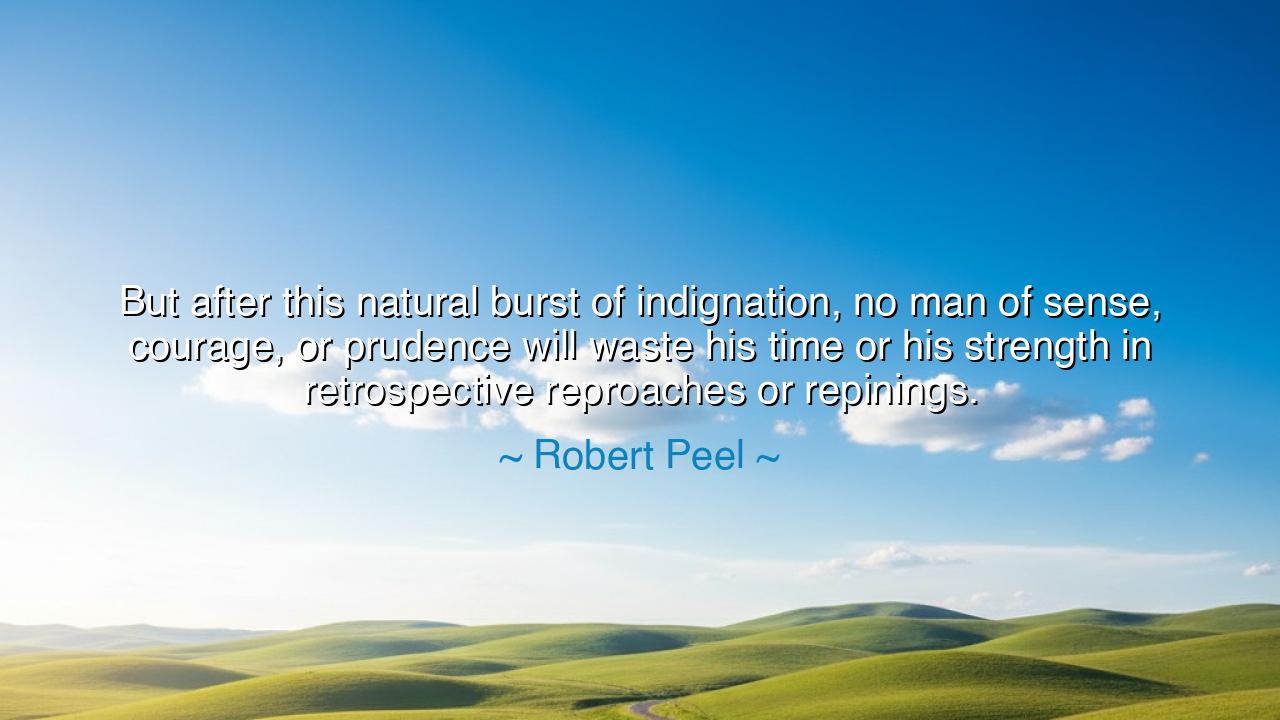
But after this natural burst of indignation, no man of sense
But after this natural burst of indignation, no man of sense, courage, or prudence will waste his time or his strength in retrospective reproaches or repinings.






Sir Robert Peel, statesman and reformer, spoke words that ring with the firmness of iron and the calm of wisdom: “But after this natural burst of indignation, no man of sense, courage, or prudence will waste his time or his strength in retrospective reproaches or repinings.” In this saying lies a law of the spirit as unchanging as the law of gravity — that anger, regret, and self-reproach, though natural, must not be allowed to reign beyond their moment. The noble soul feels indignation as fire passes through iron — it tempers him, not consumes him. Peel reminds us that it is the mark of sense, of courage, and of prudence to move forward when the moment for lament has passed.
In every life, there are moments when the soul recoils from injustice or failure, when indignation bursts forth like a storm across a calm sea. Such emotion is not evil; it is human, even righteous. It shows that the heart still burns with moral flame. Yet to dwell upon what cannot be changed, to turn endlessly the wheel of regret, is to chain one’s spirit to the past. The wise, like Peel, knew that strength lies not in the fury of the tempest, but in the quiet resolve that follows it. The fire of indignation must forge action, not ash.
Peel himself was no stranger to such tempests. As a man of politics in turbulent times, he endured fierce opposition and bitter reproach. When he repealed the Corn Laws in 1846 — an act of courage and prudence that saved his country from famine — he was cursed by friends and foes alike. Yet he did not waste his soul upon retrospective reproaches. He bore the blows, accepted the loss of power, and stood firm in the knowledge that he had done what was right. History, that silent judge, vindicated him in time. Here was a man who felt the sting of indignation but refused to be its prisoner. His mind remained fixed not upon the ashes of yesterday, but upon the shaping of tomorrow.
In the teachings of the ancients, we hear the same wisdom echoed. The Stoic philosopher Epictetus warned that grief over what is past is vanity — for the past is beyond the reach of man or god. One may mourn an hour, but not a lifetime. The man of sense accepts the limits of what can be changed; the man of courage acts within those limits; and the man of prudence guards his strength for what still lies ahead. Thus, the truly wise soul is not without feeling, but he is master of it. He allows emotion to pass through him, but not to stay and rot his peace.
Yet, how often do we fall into this subtle trap of self-torment! How often does the mind whisper, “If only I had spoken… If only I had waited… If only I had chosen differently…” Such thoughts, like ghosts, drain the living of their vitality. The past cannot be re-formed by lament, only by learning. Every failure, every loss, is but a teacher in disguise. The wise do not strike their breast and wail; they bow to the lesson, then walk on with clearer eyes and steadier hands. To live in retrospective reproach is to die before death has come.
Therefore, let your indignation burn pure and brief, as lightning splits the night. Feel it, honor it, but let it pass. Then, in its wake, let prudence take the reins, and courage guide your steps. Do not waste your sacred energy in complaints, whether against yourself or against fate. The river does not argue with the stone; it flows around it, patient and persistent, until even the hardest rock yields. So too must you let your life flow onward, shaped but not stopped by its storms.
And so, child of thought and spirit, take this teaching as a shield for the days to come: feel deeply, but do not dwell. When wronged, do not cling to wrath; when mistaken, do not bow to despair. The strength of a wise man is not in his perfection, but in his return to calm. Do what is right, accept what is done, and look always to what can yet be shaped. For no man of true sense, courage, or prudence wastes his heart in regret — he builds from it. Let your indignation give birth to wisdom, your pain to patience, and your past to purpose. Thus will you walk the path of the strong, and peace shall follow you like a faithful shadow.






AAdministratorAdministrator
Welcome, honored guests. Please leave a comment, we will respond soon